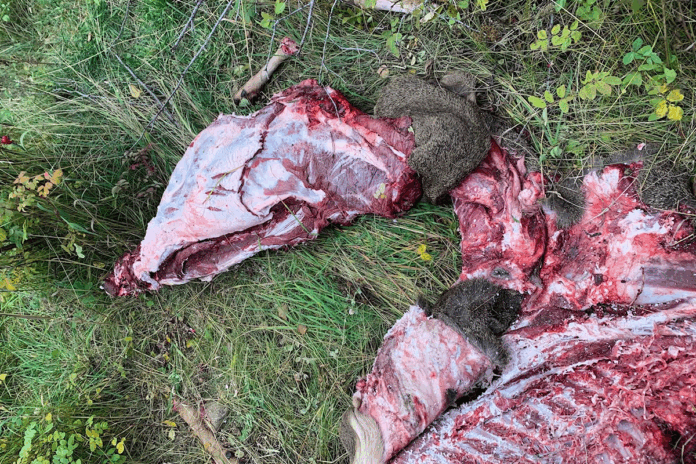A young mule deer buck found shot and partially butchered near Burns Lake has prompted a warning from the B.C. Conservation Officer Service about hunting laws and the importance of reporting mistakes.
“It’s possible somebody shot it, then walked up and realized—oops! And instead of self-reporting, which they’re supposed to do, they walked away,” said Sgt. Stewart Bates. “They grabbed what they could in a hurry and left the scene–but that’s just a hypothesis.”
The two-point buck, estimated to be about 18 months old, was discovered just off Short Road south of the Village of Burns Lake. Photos of the carcass began circulating on social media, and based on decomposition, officers believe the animal was killed in late September or early October.
“Some of the meat was taken but not all,” Bates said.
Because the deer had fewer than four points, it would have been illegal to harvest before Oct. 1. Officers suspect it was shot before that date and say the bullet’s trajectory suggests the shot came from the road.
Provincial regulations prohibit firing from or near any named road, whether gravel or paved. Hunters must be at least 15 metres away before discharging a firearm—even on private property.
Although there is limited physical evidence to pursue charges, Bates said officers are still seeking witnesses.
“The COs noticed a number of people in the area working in fields, so it’s possible someone heard the shot or saw something.”
Fines in a case like this can add up fast. Hunting out of season carries a $1,495 fine. Additional penalties include $690 for discharging a firearm near a highway and $575 for failing to remove edible meat.
“That last one is really frowned upon,” Bates said, noting edible portions include the forequarters, backstraps, neck and rib meat. Bones do not need to be recovered.
Bates said officers regularly receive reports from the public about possible violations and encouraged hunters to contact COS immediately if they realize they’ve made a mistake. While charges may still apply, penalties are often reduced if the incident is self-reported.
In a past case, officers determined a hunter had mistakenly shot a deer out of season but chose not to remove the meat, possibly fearing it would suggest intent. Although the kill was accepted as accidental, the failure to harvest edible portions still resulted in a fine.
Bates said that kind of decision only compounds the issue and underscores the need to understand the regulations and follow proper steps when errors occur.
Nonetheless, in this case, if an investigation proceeds in the Short Road incident, he said, the combination of road discharge and failure to remove meat would be treated seriously.
“It’s always better to self-report. A lot of COs hunt and understand how honest mistakes can be made. Everyone has cell phones these days, and there’s probably someone watching. More and more we’re getting people sending in pictures.”




